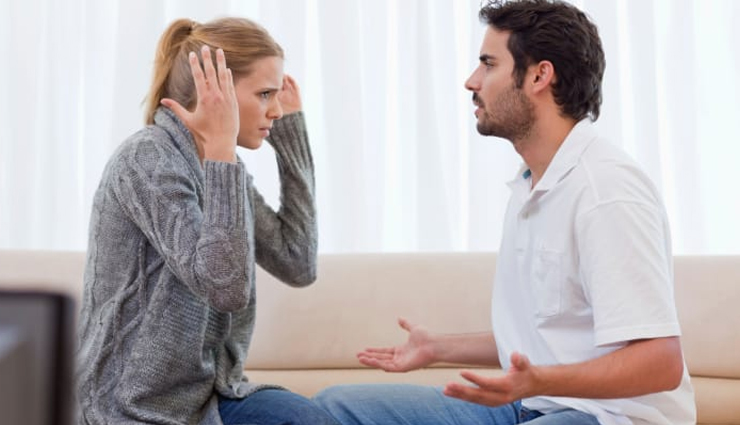- Home›
- Mates & Me›
- 10 Alarming Signs Of Codependency That Start The Pattern
10 Alarming Signs Of Codependency That Start The Pattern
By: Priyanka Maheshwari Wed, 09 Aug 2023 4:51:53

Many of us fail to recognize that we're involved in an unhealthy relationship until a significant event disrupts our perspective. It's possible that someone has pointed out signs of codependency or negative dynamics between you and your partner. You can either accept their observations or dismiss them.
However, if this conversation takes place with a close friend or family member, it's likely wise to pay attention. Often, we remain blind to these patterns in our relationships and within ourselves until it's too far gone. We're reluctant to acknowledge that something might be amiss.
If you've been contemplating the presence of codependency in your relationship, you've landed in the right spot. Being codependent entails relying on someone else for your emotional well-being and happiness. Your focus on their feelings and actions overshadows your own. You may become excessively dependent, though you might not perceive it as such.
In your view, you're simply a dedicated partner willing to go to great lengths for your loved one.
The challenge lies in prioritizing your needs as secondary. While they flourish, you experience hardship.

# Your partner’s feelings always come first
It's natural to take your partner's emotions into account and occasionally set aside your own needs. However, if you consistently prioritize your partner's feelings over your own without considering your own well-being, this indicates an unhealthy manifestation of codependency.
When you're not at ease, you should have the confidence to express a "no."
# Your partner manipulates you during fights
At times, during arguments, we utter things that would be better left unsaid. However, as a relationship progresses, boundaries are established, and individuals develop the ability to communicate effectively. If your partner resorts to manipulation during disagreements, it's a definite indication that the relationship lacks a healthy dynamic.
# Your partner’s happiness is your priority
Listen carefully, it's important to give your partner's feelings a significant place, but that doesn't imply that your own feelings should be consistently overshadowed.
This situation is intricate, and indeed, there might be instances where sacrifices are necessary, but there's a limit to this. If you consistently prioritize their feelings above your own, it has the potential to foster resentment and foster codependency.

# You don’t have a sense of personal identity
One of the most evident indications of codependency emerges when your sense of self begins to fade. While it's entirely natural for partners to engage in shared activities and hold similar viewpoints, it's crucial to remember that you maintain your individuality.
Your well-being should not be solely contingent on your relationship, as you possess other aspects of life, including friendships, family, and personal interests.
# You make excuses for your partner’s behavior
Each of us possesses imperfections, leading us to occasionally behave or utter things that are less than ideal. Yet, these encounters serve as opportunities for learning valuable life lessons. Nonetheless, it's important to note that your partner shouldn't evade accountability for their actions solely due to your tendency to make excuses for them.
# You struggle to make decisions in your relationship
Within thriving relationships, it's customary for partners to jointly make choices for the betterment of the relationship. After all, you're in a partnership because you have confidence in your partner's judgment.
Nonetheless, if you find it challenging to contribute to decision-making within your relationship, this becomes a signal of potential codependency. In such cases, a significant portion of decision-making often rests with your partner, which detracts from the essence of shared decision-making and togetherness.

# You feel your partner’s pain
During moments of difficulty faced by our partners, it's instinctive to share their emotions and offer empathy. You might find yourself inclined to shoulder your partner's emotional weight, driven by a desire to shield them from suffering.
However, in cases of codependency, this inclination goes further as you absorb their anguish, internalizing it as your own.
# If you’re honest with yourself, you feel taken advantage of
Your heart is brimming with kindness and affection, characteristics your partner is well aware of. These attributes are precisely what individuals seek in their significant others, yet there are instances where some may exploit them. When you begin to sense a lack of genuine appreciation and instead feel exploited, this situation becomes one of the indicators of potential codependency.
# You fear being abandoned
While you might not experience positivity within your codependent relationship, there exists a fear of abandonment by your partner. This apprehension is among the driving factors that keep you invested in the relationship. Despite recognizing its lack of healthiness, the prospect of them leaving prevents you from disengaging.
# You do the giving, your partner does the taking
In the context of the relationship, you find yourself consistently offering to your partner, and this isn't inherently negative. Within a wholesome relationship, investing in the partnership is essential. However, this dynamic is effective only when both individuals contribute equally to the relationship.
In the case of codependency, one party tends to extract more from the relationship than they contribute.





